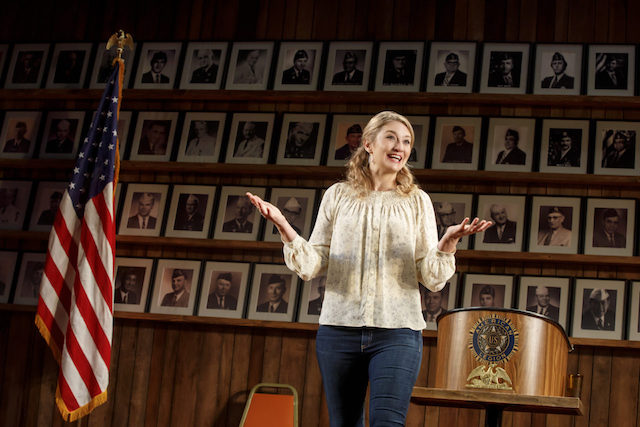By Elyse Trevers
I generally don’t read reviews, so I had few expectations about “What The Constitution Means To Me” written by and starring Heidi Schreck. I knew that it ran successfully off-Broadway and then transferred to The Helen Hayes Theater. Although I was familiar with Miss Schreck, a pleasant, talented performer, I must admit I still wasn’t particularly enthusiastic about seeing this original work. Described as a play about a 15-year-old girl who enters debates about the American Constitution at American Legion Halls to earn money for college, it sounded like a sleeper to me. However, I was pleasantly surprised as the play progressed, and Heidi discussed relevant politics and women’s issues.
Heidi introduces the premise of her play, explaining that as a teenager, she successfully won speech competitions to pay for her schooling. For this play, she attempts to recreate her speech for us. First, we were to imagine her as the 15-year-old she had been, and for the duration of the performance we were to be a bunch of older white male judges.
The stage is set to vaguely resemble a mid-western American Legion hall in Wenatchee, Washington, complete with over 100 photos of male members. She begins behind the podium and starts her speech, explaining that the Constitution is “a living document” and comparing it “to a crucible.” (Her major opponent on the debate circuit compared The Constitution to a patchwork quilt.)
The “judge”, Mike Iveson, initially explains the rules and notes that debaters will have to relate personally to the amendments. After their initial speeches, the debaters will select an amendment and speak extemporaneously about it.
Heidi “selects” Amendment 14, section one, which she explains came after Amendment 13 that freed the slaves. The Amendment guarantees equal treatment under the law and protects the right to vote. She notes that this is the first time the word “male” is actually used in The Constitution. She discusses immigration (a particularly thorny topic today) and “good” immigrants. She refers to her great-great grandmother who was a mail order bride but died in the U.S. in a mental hospital. Then the tenor of the play changes, becoming more about women and their lack of rights. She talks about a woman’s right to choose.
About a quarter way through the play, she gives up her girlishness and becomes herself, an adult woman. She even turns to Iveson and says, “I don’t know what your purpose is anymore.” She shares some startling statistics, noting that “three women are murdered every day in this country by a male partner. One in three American women is sexually assaulted during their lifetime. One in four American women is raped during her lifetime.”
The rest of the show feels like a feminist treatise and rather than what the Constitution covers, it describes who “isn’t” covered by the Constitution.
The actress talks about how women are treated under the law, particularly married women, and how often legal matters remove the emotion and humanity from cases. In Castle Rock vs. Gonzales, Jessica Gonzales’ husband ignored the restraining order against him and kidnapped her three daughters. Despite her pleas for help, the police refused to respond and didn’t even file a report. By morning, Mr. Gonzales had murdered the three girls. So Jessica sued the police department for failing to show up to protect her. (Schreck’s use of a tape in which two Supreme Court Justices parse the word “stall” would have been funny except the horrible consequences of the case.)
As a conclusion which went on unnecessarily long, Heidi “debates” with a high school student. Two students, Thursday Williams, and Rosily Ciprian alternate in the part. Williams debated getting rid of the Constitution while the actress debated that the country should keep the Constitution and work to change it. Finally an audience member casts the final vote — in this case — “keeping the document.” Then the two women asked one another questions, which seemed pointless and irrelevant to the play.
I attended begrudgingly but found myself entertained and enlightened. Heidi Shreck is affable and charming, and despite the density of the material, the document becomes quite vivid. Directed by Oliver Butler, “What The Constitution Means To Me” is not at all stultifying; in fact, it is enlightening. More importantly, as we all left clutching our own personal copies of The Constitution, it actually was a call to action.



